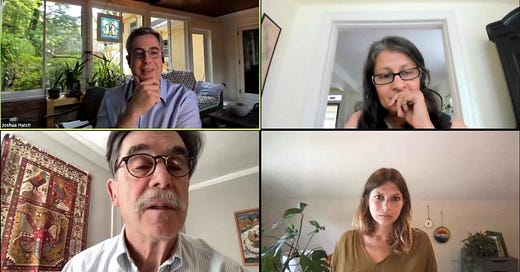✍️Science Writing News Roundup #46 (May 31, 2021)
By changing their framing of scientific failures and discoveries, journalists can bolster trust in science.
In KSJ’s science editing webinar series, a masterclass on climate journalism. Journalists from NPR, Yale Environment 360, and Southerly Magazine spoke about the urgency of the climate crisis — and how to tell stories that resonate. Clockwise, from top left: Joshua Hatch, Neela Banerjee, Lyndsey Gilpin, and Fen Montaigne. Image by Knight Science Journalism @ MIT
🎙️ Interviews and articles
Academic journals, journalists perpetuate misinformation in their handling of research retractions, a new study finds. Journals can take months to years to retract unreliable research. Journalists often fail to tell the public when scientific discoveries later are determined invalid or fraudulent, a new paper reveals. Plus: 4 tips for tracking flawed research.
Talking science and the media with Fiona Fox, the CEO of the Science Media Centre in London. In this Pros and Comms episode, Maaria Ginai talks with Fiona Fox about why the SMC was founded, how it works with scientists and journalists to report science accurately, and why controversy doesn’t have to be a detriment to science.
By changing their framing of scientific failures and discoveries, journalists can bolster trust in science. Researchers urge newsrooms to present scientific errors and academic journal retractions as part of science's self-correction process.
🧭 Resources and tips
#5 rule of pitching: Make it sparkle. Don't lose an interesting idea in a boring pitch. “If you have a fascinating story in your sights, prove that to an editor by writing a fascinating opening,” writes Jacqui Banaszynski.
The Climate Science Rapid Response Team is a match-making service to connect climate scientists with lawmakers and the media. The group is committed to providing rapid, high-quality information to media and government officials.
A freelance writer shares tips for creating — and protecting — your professional website. Figuring out how to create a website can be overwhelming. Should you try to design it yourself or use a professional? And what design features will attract editors and convince them to hire you?
9 tips for effective collaborations between journalists and academic researchers: Want to get a researcher-reporter partnership off the ground? Check out these tips based on years of collaboration between reporter Rachel Dissell and sociologist Rachel Lovell.
🎬 Videos
Frontline scientific reporting in the age of COVID-19 with Apoorva Mandavilli, a reporter for The New York Times.
How to apply for the Creative Science Writing Workshop. This workshop aims to nurture new voices in science writing by bringing aspiring writers, established authors and agents together to exchange approaches and ideas. The workshop is open to applications worldwide.
🎨 Opportunities
“Pitch us a food, farming, and climate story.” Over the course of four months, Climate Tracker plans to work with a group of six international early-career journalism fellows to develop a series of powerful feature stories focusing on key issues and events linked to the Glasgow Process. Deadline to apply: June 16, 2021.
The Association of British Science Writers has set up a program of diversity scholarships to help train more science writers at its 2021 Summer School of Science Journalism. There are 50 scholarships and the application deadline is June 16, 2021.










🗓️ Events
Science Writers and Communicators of Canada 2021 Virtual Conference (June 7-17, 2021)
Science Writers' Boot Camp (Institute for Basic Biomedical Sciences, Johns Hopkins University School of Medicine, June 7, 2021)
Introductory Storytelling Workshop (The Story Collider, June 7, 2021)
Transitioning to Writing for Podcast and Video (June 9, 2021)
Misinformation or censorship: science reporting and social media (June 22, 2021)
Science Journalism Summer School: A one-day event for people starting or returning to a science writing or journalism career (July 8, 2021)
🏆 Jobs
Journalist, Carbon Brief, UK
Night Editor, STAT, Remote
Citizen Science Freelance Research Assistant, Science Friday Initiative
Manager, Science Communications, AstraZeneca, Cambridge, UK
More jobs 👉Science Writing News Roundup #45
👉 Don’t miss any updates from the Science Writing News Roundup:
Worried you missed something? See previous newsletters here. What would you like to see in the newsletter? Please send me your suggestions by replying to this email: sciencewriting@substack.com 😃
Thanks for reading. How about sharing this with a friend? 💙





